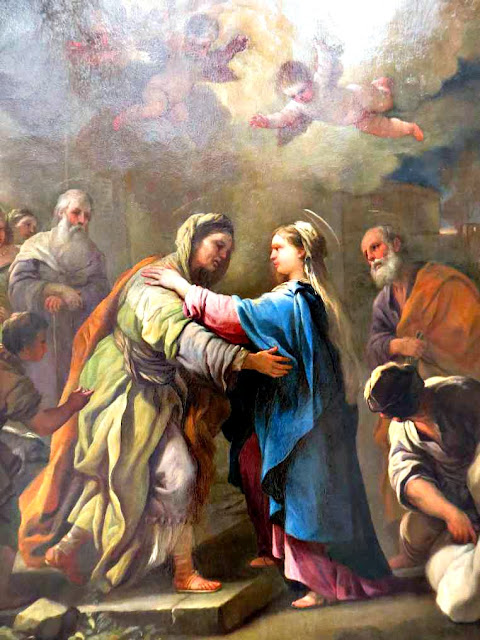Feast of the Visitation of the Blessed Virgin Mary
Die Heimsuchung Mariens (The Visitation), 1695/1696, by Luca Giordano
May 31 is the feast of the Visitation of the Blessed Virgin Mary, which recalls Mary's visit with her cousin Elizabeth. This event is also the second joyful mystery of the rosary -- the first being the Annunciation.
Elizabeth had been barren all her life, but in the Annunciation, Mary learned that her kinswoman was miraculously expecting a child in her old age. Upon hearing this good news, Mary fervently desired to share in Elizabeth's joy and serve her during the last part of her pregnancy. So she went "with haste" to visit Elizabeth and remained with her for three months.
Mary's first action after God had come to dwell in her was one of self-denying charity. She undertook a troublesome journey in order to visit her cousin Elizabeth. Thus, she proclaimed charity to be the virtue which above all Christ brought with Him from heaven. God made Mary's visit the occasion of a wonderful miracle. On her entrance into St. Elizabeth's dwelling, St. John Baptist was cleansed from sin in his mother's womb. Mary was the channel of this exceptional privilege of the cleansing away of sin in the case of the unborn child. As then, so now: Mary is the channel of all graces, and above all, of the restoration of the sinner to friendship with God. Mary's charity is not less present now than at the time of the Visitation. She is far more eager now than then to promote the happiness and console the sorrows of those who come to her for help.
Let us share everything with our Mother -- our sorrows, our joys, and all that is in our hearts. She never tires of our prayers and is always interceding on our behalf. Let us also imitate the Blessed Virgin Mary in the virtue of charity toward others, especially to those in our own family.
Saint Quote:
“Moved by charity, therefore, Mary goes to the house of her kinswoman.... While every word of Elizabeth’s is filled with meaning, her final words would seem to have a fundamental importance: ‘And blessed is she who believed that there would be a fulfillment of what had been spoken to her from the Lord’ (Luke 1:45). These words can be linked with the title ‘full of grace’ of the angel’s greeting. Both of these texts reveal an essential Mariological content, namely the truth about Mary, who has become really present in the mystery of Christ precisely because she ‘has believed.’ The fullness of grace announced by the angel means the gift of God himself. Mary’s faith, proclaimed by Elizabeth at the visitation, indicates how the Virgin of Nazareth responded to this gift” -- Pope St. John Paul II, Redemptoris Mater (The Mother of the Redeemer), 12.





Comments
Post a Comment
Comments are moderated and are published at the blogger's discretion.